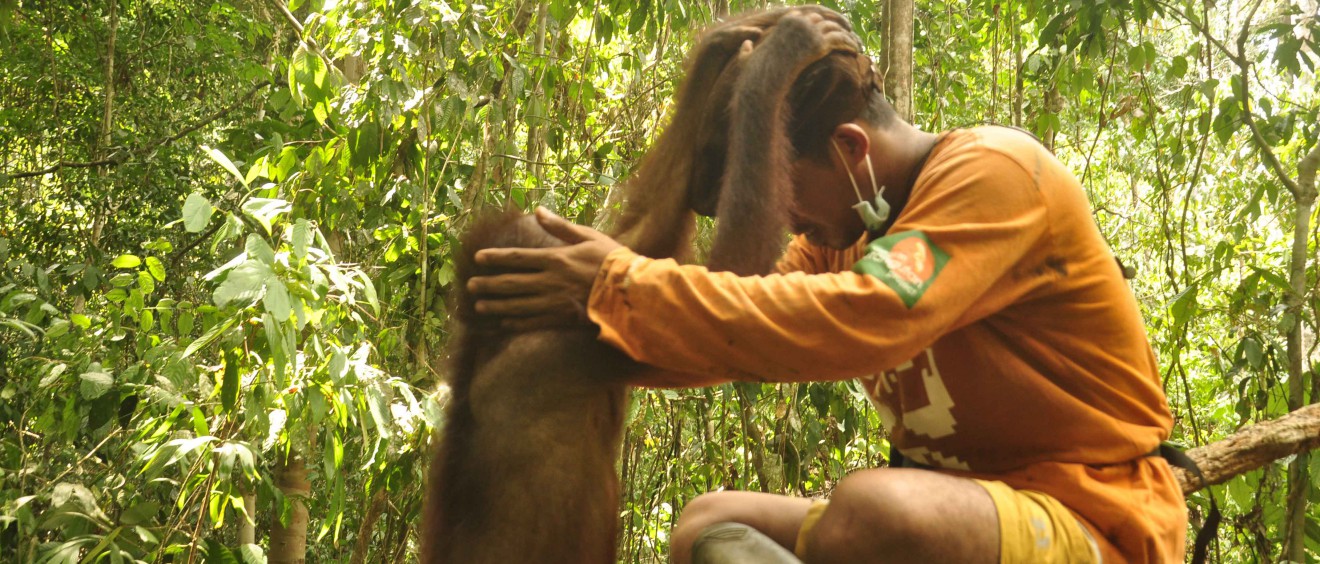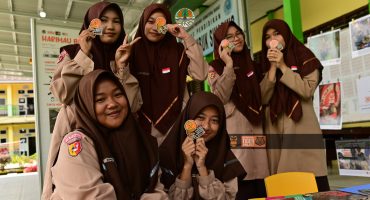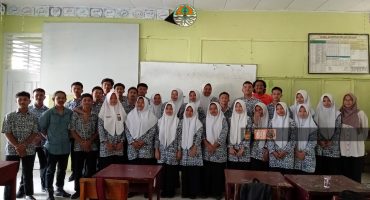
A PROCESS JUST LIKE SCHOOL
We simplified the rehabilitation of orangutans just like school process. Because orangutan rehabilitation centre is not an animal breed. Most of orangutans who entered the rehabilitation centre are the victims of conflicts such as illegally kept as pet and have medical issues (got trapped, etc)
Orangutans that have been long in captivity are not good at climbing. They do not know how to find food, make a nest, even they do not know who their natural enemies are. They’re no longer orangutans, but have became a citizen.
During their time in rehabilitation centre, orangutans will go to school forest i.e. their cage will be open every morning and animal keepers will take them to “school” in the jungle. Animal keepers are not their teachers who teach, but other orangutans in the same class will become their stimulant or examples for others to follow and imitate. In the evening, they return to their cage.
We analogize entering elementary school as learning how to climb, moving from one tree to another, until well practiced. Then, they’ll enter senior high school to learn how to find and recognize their natural food and learn to make nests. We consider they’ve entered the senior high school when they start skipping a lot, which they tend to disappear in the school forest, not willing to go back when it’s late, because they’re already comfortable in their nests. That’s the sign that they’re becoming wild.
Before they are released, orangutans need to enter a higher degree of school, that is an “university” in the form of island. COP Borneo, which located in Berau, East Kalimantan, has that “university” or pre-release island. An island with fig trees, which is orangutan’s favourite, is the training place for orangutans who have passed ‘high school’. They are left outside in the sun or rain, no more cages, only food will be given in the morning and evening. On average, they train independently for 1-2 years. Once their behaviour considerably good, then they will undergo a final defense session that is final medical examination. if they pass, the orangutans will be graduated by releasing them back to their natural habitat.
Novi’s story, as a male orangutan who were forced to separate with his mother, taken care illegally by locals with chain on his neck (because it’s cheaper and easier to maintain than an iron cage), confiscated, rehabilitated, and finally released in early November 2018.
Novi is known as a smart orangutan and high adaptability, when his friends were still in ‘elementary school’, he was already in ’senior high school’. That’s how we simplify a rehabilitation process. The process takes a long time and costs a lot, so please do not buy and pet wild animals! (SAR)
PROSES SEPERTI KITA SEKOLAH
Kami menyederhanakan orangutan yang masuk rehabilitasi seperti proses sekolah. Karena pusat rehabilitasi orangutan bukanlah penangkaran. Mayoritas orangutan yang masuk rehabilitasi adalah dari konflik seperti pemeliharaan ilegal dan ada faktor medis (seperti terjerat, dll).
Orangutan yang lama dipelihara tidak pandai memanjat, tidak mengerti mencari makan, tidak tau membuat sarang dan tidak tahu musuh alaminya. Bukan lagi orangutan tetapi menjadi orang kota.
Selama di pusat rehabilitasi, orangutan akan sekolah hutan yatu setiap pagi kandan dibuka dan diajak ‘sekolah’ di hutan. Animal keeper bukanlah guru yang mengajar tapi orangutan lain yang satu kelas dengannya yang akan menjadi perangsang atau contoh agar yang lain mengikuti dan mencontoh. Ketika sudah sore, orangutan kembali lagi ke kandang.
Kami mengibaratkan masuk SD yaitu belajar memanjat, berpindah dari pohon ke pohon hingga mahir. Kemudian akan masuk SMP untuk belajar mencari dan mengenali pakan alaminya dan belajar membuat sarang. Kami menganggap masuk SMA ketika mulai banyak bolosnya, yaitu sering menghilang ketika sekolah hutan, tidak mau pulang ketika sore karena sudah nyaman di sarangnya dan itu tandanya dia meliar.
Sebelum dilepasliarkan, orangutan perlu dikuliahkan, berupa masuk ‘universitas’ berbentuk pulau. COP Borneo yang berada di Berau, Kalimantan Timur memiliki ‘universitas’ atau pulau pra-rilis. Pulau alami dengan pepohonan ara yang disukai orangutan inilah para orangutan yang suka membolos itu berlatih. Mereka dibiarkan kena panas, hujan, tak ada lagi kandang hanay dukungan pakan di pagi dan sore hari saja yang masih diberikan. Rata-rata mereka berlatih secara mandiri sekitar 1-2 tahun. Ketika perilaku mereka sudah dianggap layak, maka mereka akan ‘sidang skripsi’ berupa pemeriksaan medis akhir. Jika lulus, maka orangutan diwisuda dengan dilepasliarkan kembali ke habitatnya.
Kisah Novi, orangutan jantan yang dipaksa berpisah dari induknya, dipelihara secara ilegal dengan rantai di lehernya (karena murah dan aman, kalau bikin kandang besi mahal), disita, direhabilitasi dan akhirnya dilepasliarkan pada awal November 2018 lalu.
Mengenal Novi sebagai orangutan cerdas dengan adaptasi yang tinggi, ketika teman-temannya masih di kelas SD, dia sudah di tingkatan SMA. Begitulah kami menyederhanakan sebuah proses rehabilitasi. Proses ini memakan waktu lama dan biaya tinggi, jadi mohon jangan membeli dan memelihara satwa liar! (DAN)


